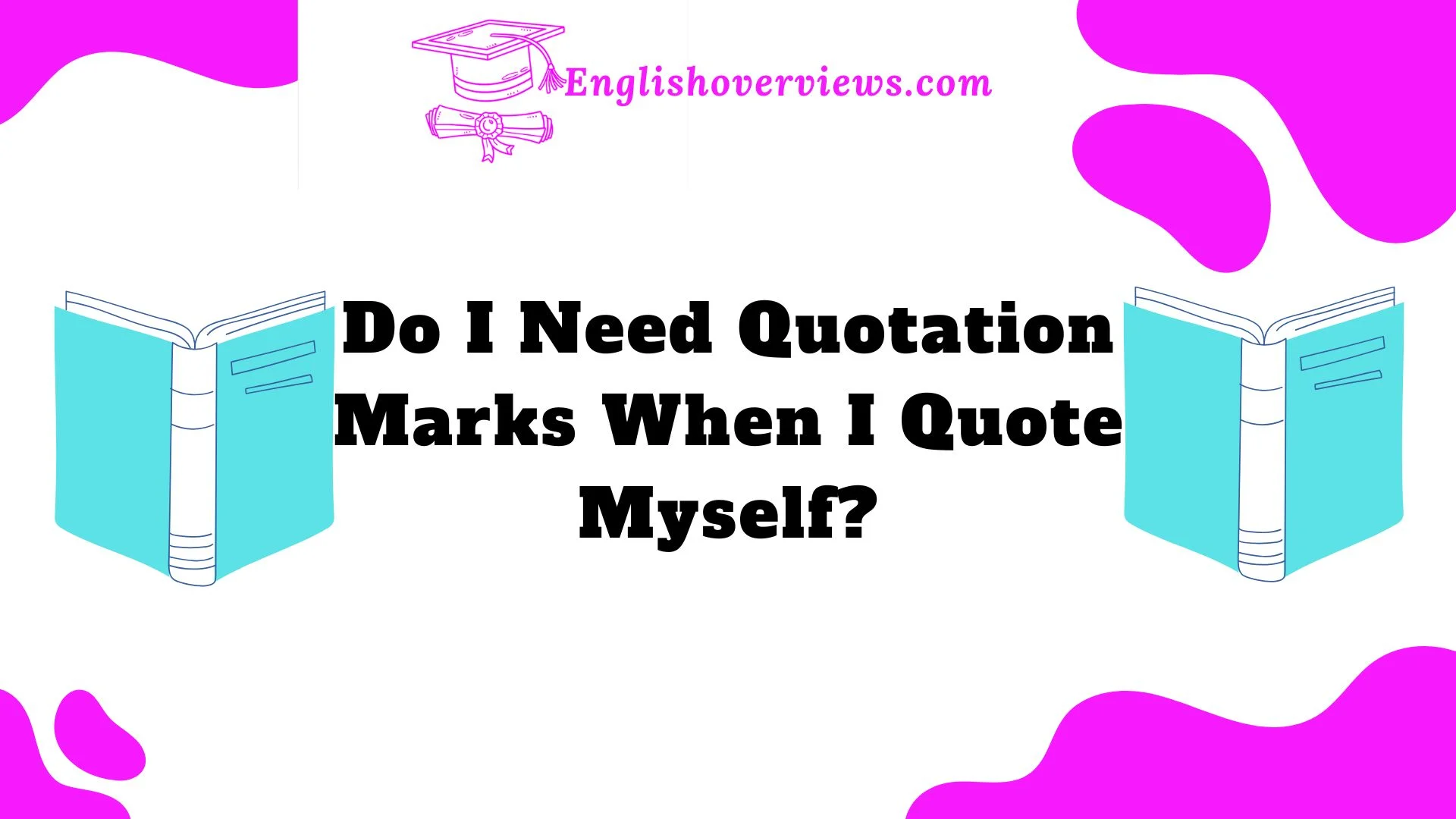Quoting yourself might seem simple, but it’s one of those aspects of writing that can lead to confusion. Do you need quotation marks? Should you cite your previous work? What are the rules for quoting yourself across different types of writing? These questions can be tricky to answer without proper guidance.
Whether you’re an academic, a creative writer, or someone managing a blog, self-quotation requires attention to context, clarity, and style. It’s not just about slapping quotation marks on something you’ve already said—it’s about knowing when and how to use them effectively. Missteps here can create misunderstandings, and in formal settings, they can even affect your credibility.
In this comprehensive guide, you’ll learn:
- When to use quotation marks for self-quoting.
- How context changes the rules.
- What popular style guides say about quoting yourself.
- Mistakes to avoid.
- How to incorporate self-quotes in different types of writing.
By the end, you’ll know exactly how to quote yourself confidently and clearly—no second-guessing required!
Self-Quotation: Understanding the Basics
Self-quotation is, simply put, quoting your own words. But it’s not always as straightforward as it sounds. Before diving into the rules, let’s define self-quotation clearly.
What Is Self-Quotation?
Self-quotation refers to reusing or referencing your previous statements, whether they’re written, spoken, or recorded. This could include quoting your past articles, speeches, or even informal conversations in a more formal context.
For example, if you’ve published an article and later want to refer to a specific excerpt in a new piece, that’s self-quotation.
Why Is Self-Quotation Useful?
Self-quotation serves several purposes:
- Establishing Credibility: Referencing your past work demonstrates authority in your field.
- Consistency: It allows you to reinforce key themes or ideas you’ve previously shared.
- Clarity: Self-quotes can help bridge ideas from past to present.
Real-World Example:
Imagine you’re a researcher who published a groundbreaking study five years ago. You’re now writing an article building on that research. Instead of paraphrasing, you might directly quote a key insight:
“Our findings revealed a 25% increase in efficiency when applying AI to logistics” (Smith, 2018).
By quoting yourself, you lend credibility to your current piece and provide context for readers.
When Should You Use Quotation Marks for Self-Quoting?
Whether or not to use quotation marks for self-quotes depends on context and intended meaning. Quotation marks are typically used to indicate a direct, word-for-word quote. However, there are instances when they aren’t necessary.
Use Quotation Marks When:
- Referencing Published Work
- If your quote comes directly from a previously published article, book, or research paper.
- Example:
“The future of renewable energy lies in localized solar solutions” (Doe, 2020).
- Quoting Formal Speeches or Presentations
- If you’re quoting yourself from a professional setting like a keynote speech.
- Example:
During my presentation, I said, “Sustainable innovation must become a priority for every industry.”
- Highlighting Specific Wording for Emphasis
- When exact wording matters, such as for memorable or impactful phrases.
- Example:
As I always say, “Small steps lead to big changes.”
No Quotation Marks Needed When:
- Paraphrasing Your Own Ideas
- If you’re expressing the same thought in new words.
- Example: My earlier research emphasized the importance of localized solar energy in achieving sustainability.
- In Informal Writing
- Blogs, emails, or social media posts often don’t require strict formatting.
- Example: I’ve always believed that small steps lead to big changes—it’s been my mantra for years.
Table: When to Use Quotation Marks
| Scenario | Use Quotation Marks? | Example |
| Referencing published work | Yes | “The role of ethics in AI cannot be overstated” (Doe, 2021). |
| Paraphrasing your own statement | No | My past research explored the ethics of AI in depth. |
| Formal reports or presentations | Yes | “Customer experience is the backbone of success,” I said during the meeting. |
| Casual blogs or emails | No | I mentioned in a previous post that customer experience is key. |
The Role of Context in Self-Quotation
Context is the key factor that determines whether quotation marks are necessary. Writing in different formats—formal vs. informal—demands different approaches to self-quotation.
Formal Writing
In academic or professional writing, quotation marks are almost always required for direct quotes. Why? Because these formats prioritize accuracy, transparency, and consistency.
Example:
In a research paper:
“Our findings confirmed a 40% reduction in costs with this new method” (Smith, 2019).
Key Tip: Follow the style guide required for your writing (e.g., APA, MLA, or Chicago).
Informal Writing
For blogs, personal essays, and casual writing, quotation marks can be optional as long as the meaning is clear.
Example:
In a blog post:
I’ve written about this before: sustainability starts with individual action.
Adhering to Writing Style Guides for Self-Quotation
Style guides provide specific rules for using quotation marks when quoting yourself. Here’s a breakdown:
| Style Guide | Rule for Self-Quotation | Example |
| APA | Use quotation marks for direct quotes and include in-text citations. | “Digital transformation is essential for growth” (Doe, 2020). |
| MLA | Quote yourself like any other source; include citations in the Works Cited. | “Cultural shifts define market trends” (Doe 34). |
| Chicago | Use quotation marks and footnotes for attribution if needed. | “Economic policies impact social change.”¹ |
Common Pitfalls in Self-Quotation
Even experienced writers make mistakes when quoting themselves. Avoid these pitfalls:
1. Overusing Self-Quotes
Too many self-quotes can make your writing feel repetitive or self-indulgent. Use them sparingly for maximum impact.
2. Lack of Proper Attribution
Failing to cite your own work (especially in formal settings) can lead to accusations of self-plagiarism.
3. Using Self-Quotes Without Context
Always explain why you’re quoting yourself to maintain clarity.
Case Study: Using Self-Quotations Effectively
Let’s look at a real-world example.
Scenario: A professor writes a follow-up to their research article.
- Incorrect Usage: I said AI would impact ethics—this idea holds true.
- Correct Usage: “AI will transform ethical decision-making” (Smith, 2018).
FAQs
Do I Always Need Quotation Marks When Quoting Myself?
No. In formal writing, they’re essential, but informal contexts allow more flexibility.
Can I Paraphrase Instead of Quoting?
Yes! Paraphrasing is often better for avoiding redundancy.
Are There Legal Concerns?
Yes. If your work is copyrighted, cite it properly to avoid self-plagiarism.

Alyan Ashraf is the creative mind behind English Overviews, a platform dedicated to helping learners master the English language. Passionate about education and language development, Alyan specializes in simplifying complex English concepts, making learning accessible for students of all levels.











